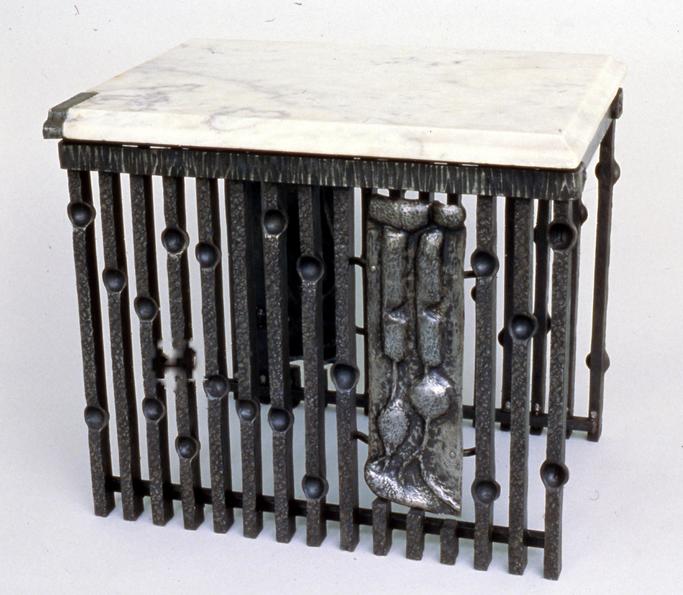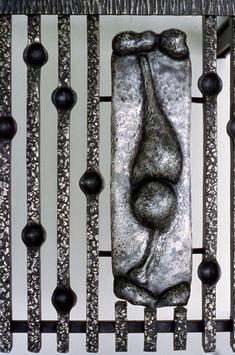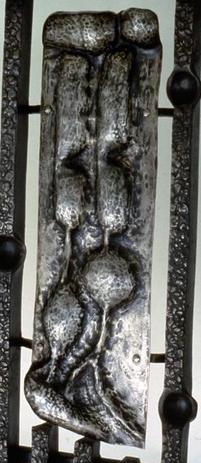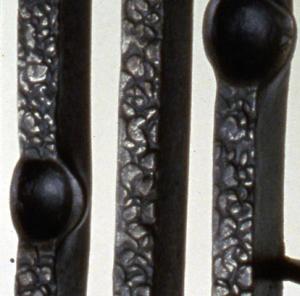Incident Light
 This end table was made to accommodate a piece of marble which the
client had rescued, hung on to and hoped someday to use for a
table top. When someday arrived and she approached me to make
it into a table, she had no preconceptions of her own and asked me to
use my own imagination. How nice!
This end table was made to accommodate a piece of marble which the
client had rescued, hung on to and hoped someday to use for a
table top. When someday arrived and she approached me to make
it into a table, she had no preconceptions of her own and asked me to
use my own imagination. How nice!
A great deal of good humor, bad physics and wonky philosophy has
appeared in books -- both novels and those claiming to be non-fiction
-- exploiting the incomprehnsibilities of quantum physics. Here I
only ask for a little Slack and some artistic license.
 The study of light leads to conclusive evidence that it is wave- or
ray-like in nature and to equally conclusive evidence that it is
particulate or quantized. Here, this duality is embodied in iron. The
vertical bars represent light rays and the ball-swaged pockets are
meant to suggest photons. The particulate quality is reiterated in
the somewhat random pattern of texturing on the surface of the bars.
The study of light leads to conclusive evidence that it is wave- or
ray-like in nature and to equally conclusive evidence that it is
particulate or quantized. Here, this duality is embodied in iron. The
vertical bars represent light rays and the ball-swaged pockets are
meant to suggest photons. The particulate quality is reiterated in
the somewhat random pattern of texturing on the surface of the bars.
The repoussé panels are forms drawn from the microstructure
of the retina, that delicate and highly ordered layer of cells at the
back of the eye where mere optics ends and the neural process of
vision begins. The cells of the retina which respond to incident
light and which initiate the complex process in the central nervous
system that we call vision, are of two kinds, called rods and
cones. The rods are responsive to relatively faint light and
effect the shades-of-grey vision we have in twilight.
 The cones are differently responsive to colors and effect our color
vision in well-lit venues. Here, the panels raised in 16 ga. steel
represent a pair of rod cells on one side of the table and a
cone cell on the other.
The cones are differently responsive to colors and effect our color
vision in well-lit venues. Here, the panels raised in 16 ga. steel
represent a pair of rod cells on one side of the table and a
cone cell on the other.
The piece of marble, in its previous life as the top of a commode
or lady's dressing table, had had a piece sawn out of one corner.
Rather than leave an unsightly jaggy, I made a iron piece to match the
moulded edge of the marble and glued it in place.
As the "rays" are made from 1/2" x 1" steel, it may appear that this
is an awkwardly heavy piece of furniture but it is so intentionally,
resistant to the eager expressions of conviviality on the part of a
large dog.
Possibly of interest to other blacksmiths
 To create the surface texture, I made a special tool. (Don't we
always?) First, I drilled three holes, arranged in a triangle, just
barely through a thin bar, so that the tip of the twist drill
penetrated but left a cup-like depression the shape of the tip of the
drill. Into each hole I placed a small bearing ball and welded them in
place from the back.
To create the surface texture, I made a special tool. (Don't we
always?) First, I drilled three holes, arranged in a triangle, just
barely through a thin bar, so that the tip of the twist drill
penetrated but left a cup-like depression the shape of the tip of the
drill. Into each hole I placed a small bearing ball and welded them in
place from the back.
Then I heated an old farrier's "turning hammer" head to an orange
heat, clamped it in the vise and hammered the bearing-ball tool into
the more convex face, moving the tool a couple or three times to get
several sharp-edged depressions on the crown of the hammer face.
Hardened the hammer, helved it and used it as a texturing hammer for
the iron "light rays".
The "photons" were made by starting a slot, carefully centered in the
bar, with a chisel and then hammering in a bearing ball welded to a
handle.
Created: Mike Spencer -- Fri 26 Dec 2008
 This end table was made to accommodate a piece of marble which the
client had rescued, hung on to and hoped someday to use for a
table top. When someday arrived and she approached me to make
it into a table, she had no preconceptions of her own and asked me to
use my own imagination. How nice!
This end table was made to accommodate a piece of marble which the
client had rescued, hung on to and hoped someday to use for a
table top. When someday arrived and she approached me to make
it into a table, she had no preconceptions of her own and asked me to
use my own imagination. How nice!
 The study of light leads to conclusive evidence that it is wave- or
ray-like in nature and to equally conclusive evidence that it is
particulate or quantized. Here, this duality is embodied in iron. The
vertical bars represent light rays and the ball-swaged pockets are
meant to suggest photons. The particulate quality is reiterated in
the somewhat random pattern of texturing on the surface of the bars.
The study of light leads to conclusive evidence that it is wave- or
ray-like in nature and to equally conclusive evidence that it is
particulate or quantized. Here, this duality is embodied in iron. The
vertical bars represent light rays and the ball-swaged pockets are
meant to suggest photons. The particulate quality is reiterated in
the somewhat random pattern of texturing on the surface of the bars.
 The cones are differently responsive to colors and effect our color
vision in well-lit venues. Here, the panels raised in 16 ga. steel
represent a pair of rod cells on one side of the table and a
cone cell on the other.
The cones are differently responsive to colors and effect our color
vision in well-lit venues. Here, the panels raised in 16 ga. steel
represent a pair of rod cells on one side of the table and a
cone cell on the other.
 To create the surface texture, I made a special tool. (Don't we
always?) First, I drilled three holes, arranged in a triangle, just
barely through a thin bar, so that the tip of the twist drill
penetrated but left a cup-like depression the shape of the tip of the
drill. Into each hole I placed a small bearing ball and welded them in
place from the back.
To create the surface texture, I made a special tool. (Don't we
always?) First, I drilled three holes, arranged in a triangle, just
barely through a thin bar, so that the tip of the twist drill
penetrated but left a cup-like depression the shape of the tip of the
drill. Into each hole I placed a small bearing ball and welded them in
place from the back.